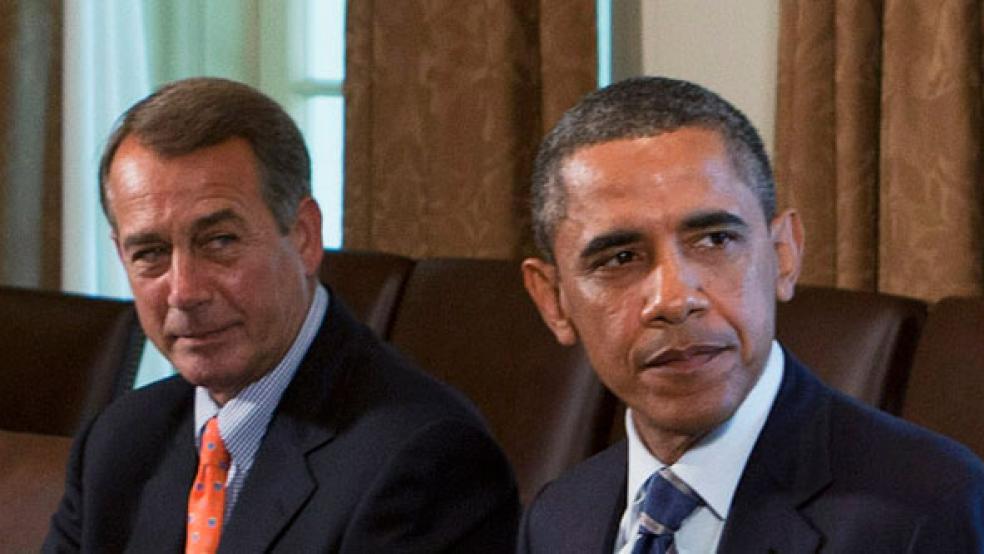Congress returns to work next week facing a crowded legislative agenda and one big question for President Obama and Republican lawmakers: Can Washington govern?

At no time since the earliest days of Obama’s presidency have conditions seemed as potentially favorable for cooperation as they do this spring, largely because both sides have reasons to want to show results.
That’s the optimistic view. But running counter is another reality. The agenda is extraordinarily challenging, and trust remains at a minimum. The issues on the calendar — gun control, immigration and the budget — strain the coalitions of each party. At the same time, existing philosophical differences and the rigid contours of political polarization stand in the way of agreements.
Obama has spent the winter working a bifurcated strategy. One part is his so-called charm offensive, his outreach to Senate Republicans designed to create some sense of goodwill. Next week he will have another dinner with GOP senators, hoping to create a climate more favorable to productive negotiations.
RELATED: Obama May Already Be a Lame Duck President
The other part of the strategy is regular trips outside of Washington designed to rally public opinion and to ratchet up pressure on Republicans to compromise. Obama just finished such a trip, which included a rally for his gun-control proposal, which faces mounting opposition, as well as a visit to California to raise money for the 2014 elections.
Republicans wonder which Obama is the real one: the man on the charm offensive or the partisan pol fattening his party’s coffers with an eye on retaking the House. The answer may be both: a president who long has believed he could bring opposing sides together and a politician who emerged from his reelection campaign with renewed confidence in his own agenda and with a harder edge.
OBAMA'S BUDGET OFFER
Obama’s inaugural address was notable for the progressive agenda he outlined and his obvious impatience with united Republican opposition. Since then, he has repeatedly said he is eager to work with Republicans who are willing to work with him and that he and they should both be willing to compromise.
The president’s latest tactical move came Friday, with reports — first in The New York Times — that Obama will offer Congress a fiscal blueprint that includes cuts in future spending on Medicare and Social Security. It is a budget designed to satisfy neither congressional Republicans nor his party’s left flank.
White House officials, who described the outlines of the package to reporters, heralded the budget as a signal to Republicans that Obama is serious about making concessions in order to produce the fiscal grand bargain that has eluded him for two years. In his weekly address Saturday, Obama said of his forthcoming budget: “While it’s not my ideal plan to further reduce the deficit, it’s a compromise I’m willing to accept in order to move beyond a cycle of short-term, crisis-driven decision-making, and focus on growing our economy and our middle class for the long run.”
Obama’s willingness to cut the two big entitlements programs dates back to his negotiations with House Speaker John A. Boehner (R-Ohio) over the debt ceiling in the summer of 2011. At the time, he persuaded House Democratic Leader Nancy Pelosi (Calif.) and Senate Majority Leader Harry M. Reid (D-Nev.) to accept cuts in Social Security and Medicare, and White House officials long have claimed that the two leaders agreed to help rally their colleagues to accept them as part of a grand bargain.
So Obama’s budget offer does not represent a dramatic breakthrough or even a fresh start. It is a small but perhaps symbolically important gesture. For the first time he is willing to put in writing what he has told Republicans in private negotiations, which is that he is prepared to cut both Medicare and Social Security as part of a compromise aimed at putting the country’s fiscal house in order. But, and only but, as part of a deal that includes more new revenue.
Republicans staunchly oppose any new taxes as part of a budget agreement. That was made clear again Friday morning, when Boehner dismissed the president’s forthcoming budget, because it includes new taxes. Boehner’s statement was neither a surprise nor likely the last word on this. Obama’s audience, for now, is not the House but the Senate, where bipartisan discussions about the budget continue.
TIME IS LIMITED
Both the president and congressional Republicans have incentives to make the most of the time between now and the August recess to turn hopeful words into productive results. There may be few better opportunities for the rest of Obama’s presidency than now. The president knows he has limited time to produce results on big issues before the 2014 elections and eventual lame-duck status get in the way of serious bargaining. Republicans, with their approval ratings still dreadfully low and having lost the popular vote in five of the last six elections, have more than enough reasons to show they are more than the party of “no.”
However, the prospects for a flurry of legislative dealmaking between now and the summer recess remain questionable. Obama’s gun-control package has run into stiff opposition, despite public support for many of the measures he has advocated. Guns were not part of his second-term agenda until the tragedy of Newtown, Conn. Obama gambled that he could take advantage of the moment. He had no choice but to move as swiftly as possible, but he may have to settle for far less than he hoped.
Immigration is another matter. Nowhere do Republicans have greater self-interest to enact legislation than on immigration. The party’s deficit with Hispanic voters, which was reinforced by Mitt Romney’s dismal performance in November, has prompted many Republican leaders to embrace a path to citizenship or legal status as part of comprehensive reform.
Despite the obvious political incentives, Republicans return next week still in search of a legislative solution that would take the issue off the table politically without rupturing the party’s conservative coalition.
RUBIO: DON'T RUSH IT
Republicans see the need for a new position on immigration. A Republican organization, Resurgent Republic, reported on four focus groups that showed GOP primary voters are now more open to immigration reform with a path to some kind of legal status, but only with stringent conditions. Meanwhile, there is little evidence that public opinion among conservatives has shifted dramatically on the issue.

That is one reason why Sen. Marco Rubio (R-Fla.), who is part of the group trying to reach a bipartisan compromise, has warned Democrats not to try to jam the legislation through. GOP leaders who want to see the reforms believe they need time to bring their base along. Immigration may offer the best current hope for bipartisan agreement, but not quite yet.
That leaves the budget as the biggest challenge, the most contentious issue and the most significant prize. Sen. Mark Warner (D-Va.), speaking recently at a breakfast hosted by Bloomberg News, said there is nothing more important for Washington politicians than breaking the fever of angst and dysfunction that has been the norm to prove to voters that the system is not irretrievably broken. He said the “metric for that, whether we like it or not . . . is the debt, deficit [and] budget issues.”Between now and late summer, politicians will provide the answer to the question of whether Washington can govern. With the economy still struggling and the impact of the across-the-board spending cuts starting to bite, that’s more than an idle question.
This piece originally appeared in The Washington Post.
Read more at The Washington Post:
Obama's Insulting Salary Stunt
Obama Rekindles Talk About Boys Club
Is This the Best the GOP Can Offer?




